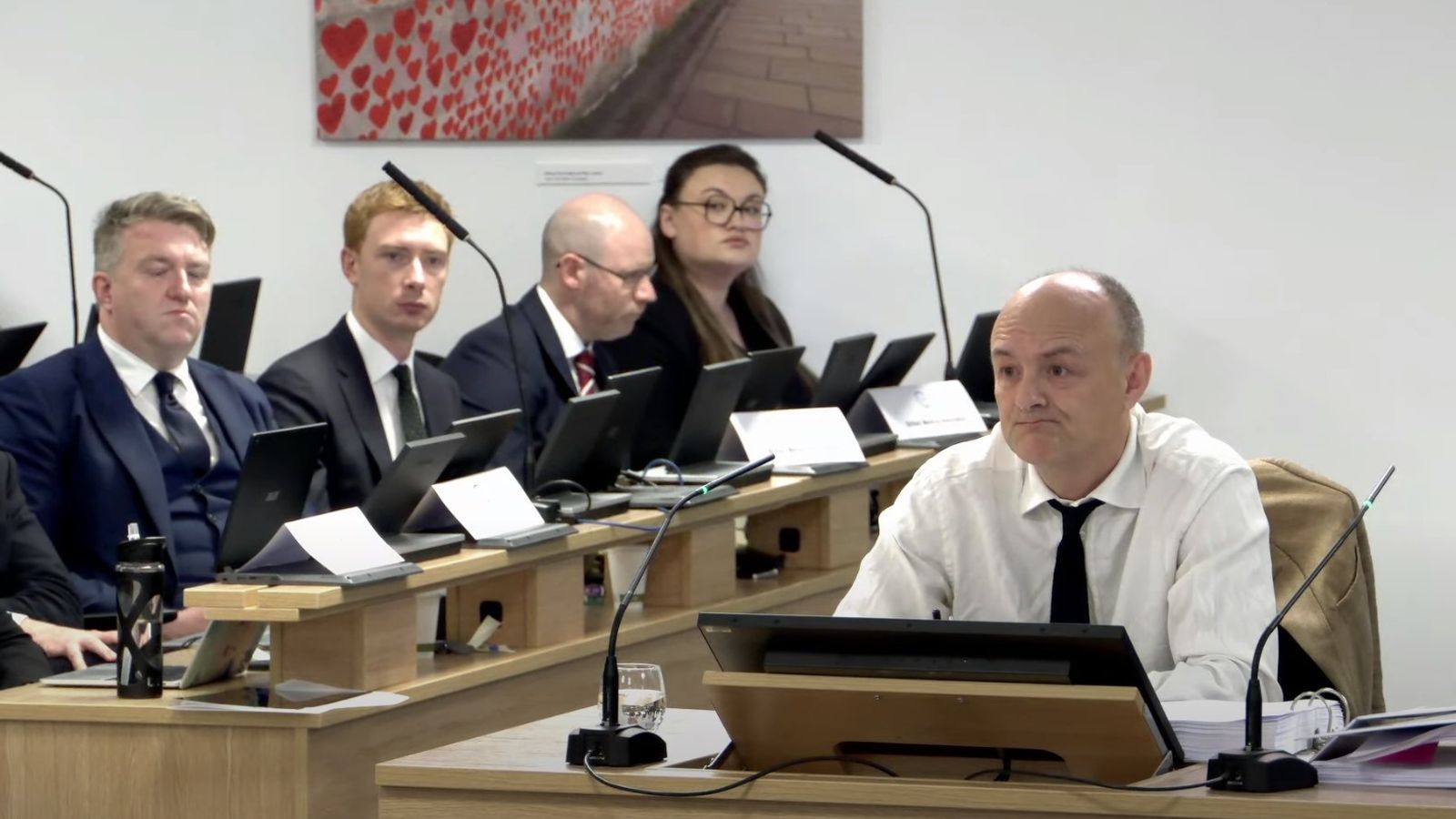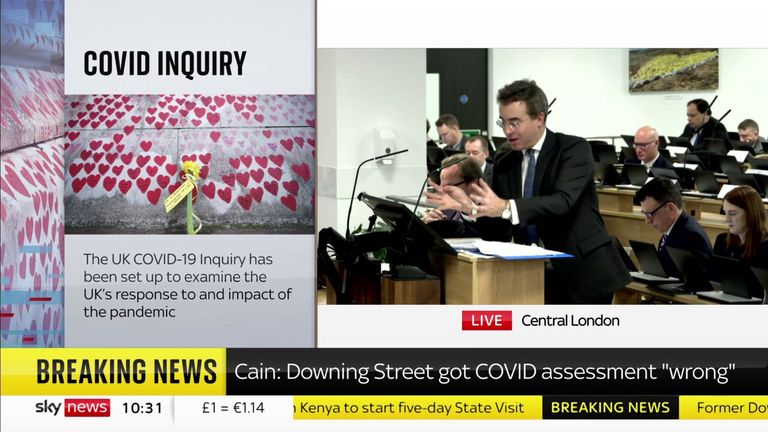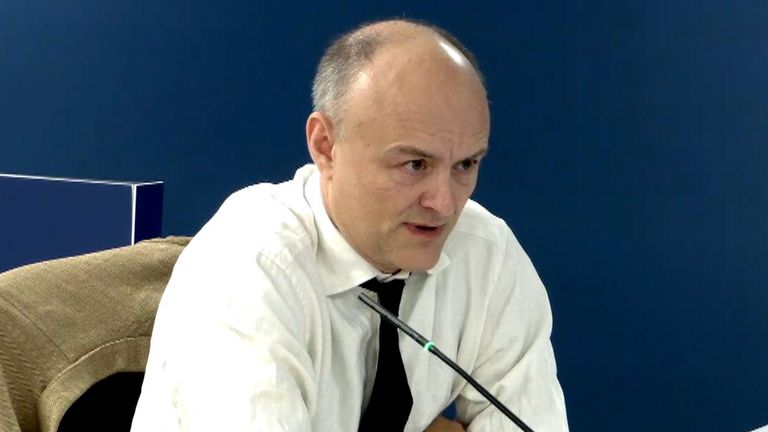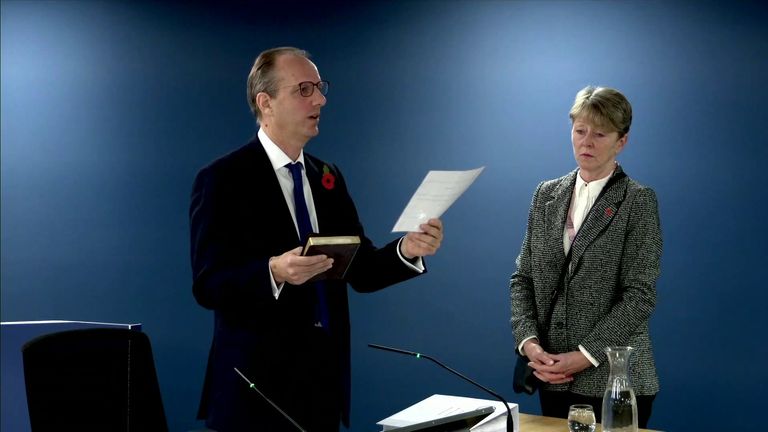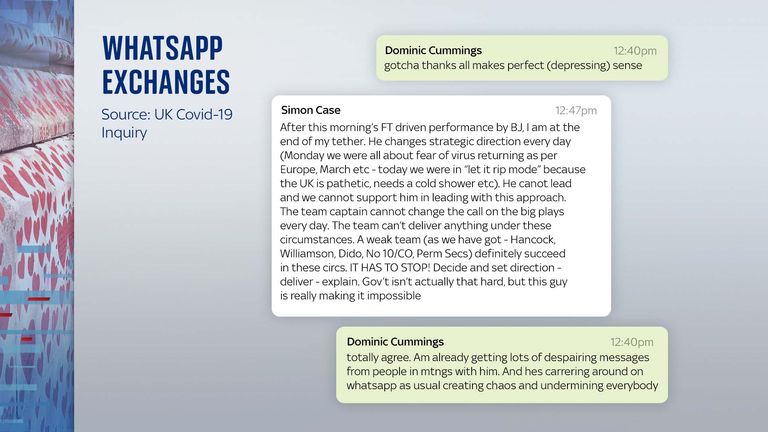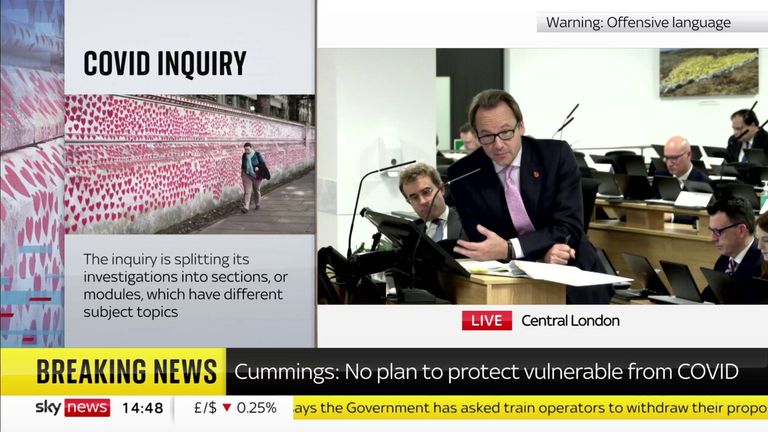The COVID inquiry took a political turn this week when a number of key figures who served in Downing Street during the pandemic faced questioning from the probe’s lawyers.
Hours of evidence were presented to the inquiry’s chair, and there were a raft of revelations uncovered – from the attitudes shown by senior ministers to the virus through to the shocking vocabulary of top advisers.
We’ve taken you through the key moments from the headline grabbing week – and what we learned.
Indecision and chaos
The overarching theme coming out of the hearings was the apparent disarray playing out behind the door of Number 10 and how long it took for the people in charge to make the big calls – especially the prime minister.
In written evidence to the inquiry, Boris Johnson’s most senior adviser, Dominic Cummings, suggested this boss was distracted from his duties as the build up began in early 2022 – with a “divorce to finalise”, “financial problems” and his then girlfriend wanting to “finalise the announcement of their engagement”.
Meanwhile, Mr Johnson “wanted to work on his Shakespeare book”.
Concerns from scientists about the virus were growing in January and February, and frightening scenes began playing out in other countries.
But there still appeared to be a reticence to act, according to those working in Downing Street, and numerous senior figures – including Mr Johnson – took their half-term breaks regardless.
At the start of March, Mr Johnson’s former director of communications, Lee Cain, sent a message to Mr Cummings, claiming the PM “doesn’t think [the pandemic] is a big deal and he doesn’t think anything can be done and his focus is elsewhere”.
It added: “He thinks it’ll be like swine flu and he thinks his main danger is talking economy into a slump.”
In another message between the pair days before the UK’s first lockdown came into force, Mr Cummings said the prime minister was “melting down” and had gone “back to Jaws mode” – referencing the mayor in the 1970s film who kept the beaches open despite shark attacks.
The chief adviser said he warned Mr Johnson of the NHS imploding “like a zombie apocalypse film” on 12 March – 12 days before lockdown was implemented – and a decision was finally taken the next day to act.
But it still took a further 11 days for the lockdown to be implemented, with Mr Cain blaming days of “oscillating” from the PM.
“The system works at its best when there’s clear direction from Number 10 and the prime minister,” he wrote in his evidence. “These moments of indecision significantly impacted the pace and clarity of decision-making across government.”
Read more:
Key WhatsApps from the COVID inquiry
Analysis: Inquiry reveals uniquely toxic, destructive set of individuals
Mr Cain also told the inquiry that “anyone who’s worked with the prime minister for a period of time will become exhausted with him sometimes” as he can be “quite a challenging character to work with” due to his indecision.
And that lack of decisiveness appeared to carry on throughout the pandemic, with Mr Cain saying the prime minister hesitated yet again over a circuit breaker lockdown in 2020 because it was “very much against what’s in his political DNA”.
“[Mr Johnson] felt torn where the evidence on one side and public opinion and scientific evidence was very much caution, slow – we’re almost certainly going to have to do another suppression measure, so we need to have that in mind – [whereas] media opinion and certainly the rump of the Tory party was pushing him hard [in] the other direction,” he said.
Mr Cain concluded that COVID was the “wrong crisis for this prime minister’s skillset”, adding: “It required quick decisions and you need people to hold the course and have that strength of mind to do that over a sustained period of time and not constantly unpick things because that’s where the problems lie.”
Mr Cummings stood by his somewhat harsher view.
He said a text in which he called ministers “useless f***pigs, morons [and] c****” actually “understated the position as events showed in 2020”.
Lack of a plan
While the public was looking to the government for help as the country was hit by crisis, evidence given to the inquiry suggests they weren’t prepared for what was coming.
Deputy cabinet secretary Helen MacNamara said she realised how much trouble the UK was in on 13 March 2020 – 10 days before the first national lockdown – after speaking to an official at the Department for Health, Mark Sweeney, who “had been told for years that there is a whole plan” for a pandemic.
“But there was no plan,” he told her.
Ms MacNamara described how she then walked into the prime minister’s study, where Mr Cummings was sat with other senior officials, and told them: “I think we’re absolutely f****d, I think this country is heading for a disaster, I think we’re going to kill thousands of people.”
Asked to what degree decision-makers considered ethnic minority groups, domestic abuse victims and others in the run-up to imposing a national lockdown, Mr Cummings said: “I would say that that entire question was almost entirely appallingly neglected by the entire planning system.”
He told the inquiry there was no shielding plan for the most vulnerable, claiming the Cabinet Office had even tried to “block” Number 10 from implementing one.
But according to evidence from Mr Johnson’s principal private secretary, Martin Reynolds, the then-prime minister “blew hot and cold” over newly formed plans to tackle the vital issues arising, leading to “very difficult consequences” for the country.
Mr Reynolds said when he did decide on the course of action, “within hours or days, he would take a contrary position”.
His evidence was echoed in messages from the head of the civil service, Simon Case, to Mr Cummings, accusing Mr Johnson of “changing strategic direction” and saying he “cannot lead”.
“IT HAS TO STOP!” wrote Mr Case, adding: “Govt [sic] isn’t actually that hard, but this guy is really making it impossible.”
But Mr Case’s criticism was not limited to the boss, blaming the “weak team” around him too – naming then-health secretary Matt Hancock, then-education secretary Gavin Williamson and the head of Test and Trace Dido Harding.
The confidence of Mr Hancock
Mr Hancock came in for a lot of criticism during the week’s hearings.
Ms MacNamara told the inquiry he had shown “nuclear levels” of confidence at the start of the pandemic, describing one particularly “jarring” encounter after she expressed her sympathy that his job amid COVID must have been tough.
“He reassured me that he was ‘loving’ the responsibility,” she said. “And to demonstrate this, he took up a batsman’s stance outside the cabinet room and said: ‘They bowl them at me, I knock them away’.”
But the accusations went beyond bravado.
Ms MacNamara also claimed Mr Hancock “regularly” told colleagues in Downing Street things “they later discovered weren’t true”.
This accusation was backed up by Mr Cummings, who gave the example of the then-health secretary having “sowed chaos” by continuing to insist in March 2020 that people without symptoms of a dry cough and a temperature were unlikely to be suffering from coronavirus.
In his coarser language, he also described Mr Hancock as a “proven liar”, a “problem leaker” and a “c***”.
By April 2020, there was a “lack of confidence of what he said was happening, was actually happening”, said Ms MacNamara.
This included Mr Hancock saying things were under control or being sorted in meetings, only for it to emerge in days or weeks that “was not in fact the case”.
There was a “pattern of being reassured that something was absolutely fine and then discovering it was very, very far from fine”, she added.
Andrew O’Connor KC, the lawyer for the inquiry, asked Ms MacNamara: “Does it come back to the fact that Mr Hancock regularly was telling people things that they later discovered weren’t true?”
“Yes,” she replied.
Sir Simon Stevens, who was head of NHS England during the pandemic, claimed that during discussions over what to do if the NHS was overwhelmed, Mr Hancock thought that “he – rather than, say, the medical profession or the public – should ultimately decide who should live and who should die”.
The health boss added: “I certainly wanted to discourage the idea that an individual secretary of state, other than in the most exceptional circumstances, should be deciding how care would be provided.”
Asked if Mr Hancock could be trusted, Sir Simon told the inquiry: “For the most part, yes.”
The former minister’s spokesperson said: “Mr Hancock has supported the inquiry throughout and will respond to all questions when he gives his evidence.”
Misogyny
Ms MacNamara told the inquiry of the “unbelievably bullish” approach to coronavirus by the government early in the pandemic, including the shocking revelation that ministers sat “laughing at the Italians” in meetings as the virus ripped through the country.
She said Mr Johnson was “confident the UK would sail through”, and her “injections of caution” in January and February 2020 “did not register”.
Why? Well, Ms MacNamara put this down to a “toxic” and misogynistic culture in Number 10, which saw “women being ignored”.
Westminster and Whitehall are “endemically sexist” environments, she added, but Number 10 and the Cabinet Office became even worse during the pandemic when women had to “turn their screens off” on Zoom meetings or were “sitting in the back row” and “rarely spoke”.
As a result of the “macho” culture, certain issues were being ignored, including how to help domestic abuse victims, the impact on carers, childcare problems, and access to abortions.
“[The] failure to appreciate all the time that what we were doing was making decisions that were going to impact on everybody’s lives, and that meant lots of real people and real consequences,” said the former civil servant.
“I don’t think there was ever enough attention paid to that.”
Asked about Mr Cummings’ use of a four letter to describe her, she said it was “both surprising and not surprising to me, and I don’t know which is worse”.
She added: “It is disappointing to me that the prime minister didn’t pick him up on the use of some of that violent and misogynistic language.”
Mr Johnson’s attitude to the elderly
In particularly galling revelations for the families of those who died, Mr Johnson’s approach to older people was raised during the hearings.
Notes from the government’s former chief scientist Sir Patrick Vallance dated August 2020 described a “bonkers set of exchanges” with the prime minister, saying he was “obsessed with older people accepting their fate and letting the young get on with life and the economy going”.
Another note from Sir Patrick shown to the inquiry and dated December 2020, revealed the influence of the wider Tory party on decision making in Number 10, saying while the PM had acted early and “the public are with him”, a number of his MPs were not.
The key scientific adviser wrote: “[Mr Johnson] says his party ‘thinks the whole thing is pathetic and COVID is just nature’s way of dealing with old people – and I am not entirely sure I disagree with them. A lot of moderate people think it is a bit too much’.”
